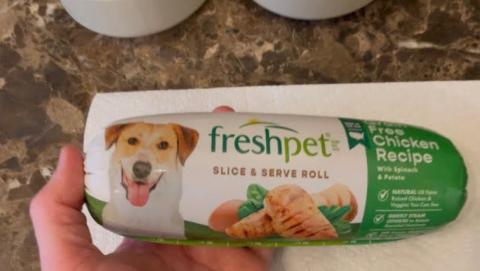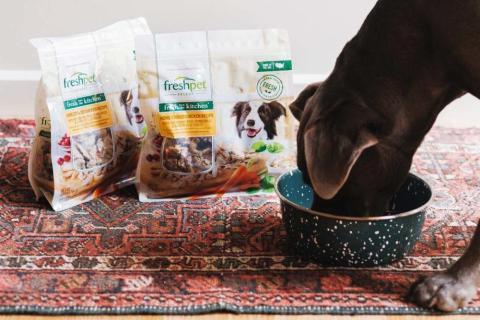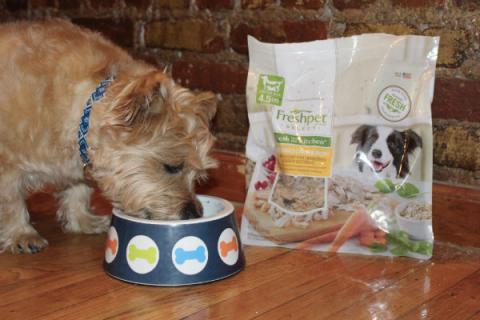
Is Freshpet Causing Weight Gain in Dogs? What You Need to Know
Published on November 12 by Julia
As pet owners, we want to provide our dogs with the best nutrition possible to keep them healthy, happy, and active. With the growing popularity of Freshpet, a brand that offers fresh, refrigerated dog food, many pet parents wonder whether it could be fattening for their dogs. The concern is understandable—just like with human diets, the right balance of nutrients is key to maintaining a healthy weight. In this article, we’ll explore the nutritional profile of Freshpet dog food, discuss how it affects your dog’s weight, and offer tips on ensuring your dog stays at a healthy weight while eating Freshpet.
What Is Freshpet?
Freshpet is a brand of dog food that prides itself on offering fresh, natural ingredients with no preservatives, artificial flavors, or by-products. Unlike many dry or canned dog foods, Freshpet is refrigerated and uses high-quality proteins, vegetables, and whole grains. The company markets its products as being closer to "homemade" meals, with a focus on healthy, wholesome ingredients.
The food is typically sold in the refrigerated section of pet stores and comes in various forms, including rolls, meals, and treats. Freshpet is a convenient option for dog owners who want to provide a more natural diet without cooking meals at home.

Nutritional Breakdown of Freshpet
The question of whether Freshpet is fattening for dogs boils down to its calorie content and the specific nutritional needs of your pet. Each dog has unique dietary requirements based on factors like breed, age, size, activity level, and health status. Let’s take a closer look at the typical nutritional composition of Freshpet dog food:
- Protein: Freshpet contains high-quality protein sources such as chicken, beef, turkey, and fish. Protein is essential for muscle maintenance, energy, and overall health. Dogs that get adequate protein in their diet are less likely to gain excessive fat and more likely to maintain a healthy body composition.
- Fats: Fats are an important source of energy for dogs, but the type and amount matter. Freshpet contains animal fats and oils, which provide omega fatty acids that support skin, coat, and joint health. However, some Freshpet products may have higher fat content, which could contribute to weight gain if fed in excess or if a dog isn't particularly active.
- Carbohydrates: Freshpet includes vegetables like sweet potatoes, peas, and carrots, as well as whole grains, which provide carbohydrates for energy. The carbohydrates in Freshpet are sourced from whole, natural ingredients, which makes them a more easily digestible and healthier option compared to some other commercial dog foods with fillers like corn or soy.
- Fiber: Fiber is important for digestive health and can help with weight management. Freshpet products typically contain fiber-rich ingredients like peas and pumpkin, which can aid in healthy digestion and keep your dog feeling fuller for longer.
- Vitamins and Minerals: Freshpet is designed to provide a complete and balanced diet, containing a range of vitamins and minerals essential for your dog’s overall health. These include vitamins A, D, and E, as well as calcium, phosphorus, and potassium, which all contribute to bone health, immune function, and more.

Can Freshpet Be Fattening for Dogs?
The short answer is that Freshpet itself is not inherently fattening, but like any dog food, it can contribute to weight gain if not fed properly. Here’s how to ensure your dog isn’t at risk of becoming overweight while eating Freshpet:
1. Portion Control
The primary reason any dog might gain weight on Freshpet—or any food, for that matter—is overeating. Freshpet provides feeding guidelines based on your dog’s weight and age, so it’s important to follow these recommendations. Overfeeding can lead to excessive calorie intake, which, if not burned off through activity, will result in weight gain.
If you’re unsure whether you’re feeding the right amount, it’s always a good idea to consult your veterinarian. They can help you determine the appropriate portion size for your dog based on their activity level and metabolism.
2. Adjusting for Activity Level
Active dogs, such as working breeds, sporting dogs, or those who get a lot of exercise, require more calories than sedentary dogs. If your dog has a low activity level, feeding them the standard portion sizes could lead to weight gain. Freshpet’s calorie density is typically higher than that of dry kibble, so it’s important to adjust the portion size based on your dog’s activity level.
For instance, a dog who spends most of their time lounging indoors may need fewer calories than a dog who runs several miles a day. Freshpet offers different options that can suit both high-energy and low-energy dogs, so always consider their individual needs.

3. Choosing the Right Formula
Some Freshpet formulas are higher in fat and calories, which may be more appropriate for dogs with higher energy needs or those who have a healthy metabolism. However, for dogs prone to weight gain or those with low activity levels, opting for a formula with a lower fat content may be a better choice. Always check the label for calorie content and fat percentage when choosing a specific Freshpet product.
4. Treats and Extras
In addition to the main meals, treats can be a significant source of extra calories. Freshpet offers a variety of dog treats, some of which can be higher in fat and calories. If you're giving your dog treats throughout the day, make sure to account for these in their overall calorie intake. Consider using low-calorie or healthy treats to avoid adding excess weight.
5. Transitioning and Monitoring Weight
If you're switching your dog to Freshpet from another brand, it’s important to gradually transition over 7-10 days to avoid digestive upset. Additionally, monitor your dog’s weight and body condition score regularly. If you notice your dog gaining weight, it may be necessary to reduce portions, increase exercise, or switch to a lower-calorie formula.
Is Freshpet the Right Choice for Overweight Dogs?
Freshpet can be a great option for overweight dogs, but as with any food, it’s important to focus on the overall balance of calories and nutrients. For dogs that need to lose weight, consider the following:
- Choose a Low-Fat Formula: Some Freshpet products are lower in fat and calories, making them more suitable for weight management. Look for formulas labeled for weight control or those with lower fat content.
- Monitor Caloric Intake: As mentioned, portion control is essential. Make sure you’re feeding the right amount of Freshpet based on your dog’s current weight and target weight.
- Increase Exercise: Along with feeding a balanced diet, increasing your dog’s physical activity will help burn calories and promote healthy weight loss. Regular walks, playtime, and activities like fetch can help your dog stay fit.
Freshpet is not inherently fattening for dogs, but like any dog food, it can contribute to weight gain if fed inappropriately. The key is portion control, choosing the right formula, and adjusting for your dog’s activity level and individual needs. If you’re concerned about your dog’s weight, it’s always a good idea to discuss their diet with your veterinarian, who can help you make informed decisions about their nutrition and weight management.
By following the proper feeding guidelines and keeping an eye on their overall health, you can ensure that your dog enjoys the benefits of Freshpet without putting on extra pounds. With its fresh ingredients and high-quality nutrition, Freshpet can be a great option for many dogs, as long as it's fed in moderation and with consideration of your pet’s specific needs.